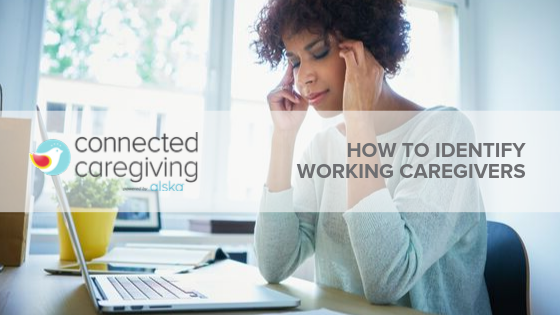You may believe you don’t have many employees in your organization who are juggling work and caregiving. It is understandable since most caregivers don’t want their employer to know they are sleep deprived, stressed out, and putting their own health and well-being on the back burner because of the demands of caring for a loved one. Here are a few tips on how to identify working caregivers in order to help them stay more focused at work.

Take notice of increasing absenteeism or requested time off.
If an employee who has always maintained good attendance and not exceeded paid time off is suddenly calling in sick or requesting additional time off, it may be because they are a caregiver. An employee can find themselves in the role as a primary caregiver without warning and literally overnight. That unexpected call in the middle of the night announcing their parent has fallen, their sister was diagnosed with cancer, or the birth of a newborn with a heart defect will send their world spinning. There is also no guidebook on how to manage all of the tasks that will be required of them that take up as much time as another full time job. If you have noticed a change in an employee that indicates they could be taking time off because of caregiving, talk to them and find out what is going on and let them know the resources your organization has to support them.
Missing project deadlines, meetings, and not returning emails or phone calls.
 Another way to identify working caregivers is by recognizing that caregiving creates a situation where working caregivers feel constantly overextended. They take their jobs very seriously and want to perform to their highest ability but the additional duties take a toll on time and energy. Imagine suddenly being told you absolutely had to take on tasks that require an additional 20-30 hours a week in addition to your already busy schedule. You have no choice in the matter and the life of your loved one is dependent on it. How would you incorporate these duties into your week? Working caregivers are exhausted and have to utilize time at work to manage caregiving tasks such as making medical appointments, giving family members updates, ordering groceries or medical supplies and researching local resources such as companion care services. There are only so many hours in the work day and somethings got to give.
Another way to identify working caregivers is by recognizing that caregiving creates a situation where working caregivers feel constantly overextended. They take their jobs very seriously and want to perform to their highest ability but the additional duties take a toll on time and energy. Imagine suddenly being told you absolutely had to take on tasks that require an additional 20-30 hours a week in addition to your already busy schedule. You have no choice in the matter and the life of your loved one is dependent on it. How would you incorporate these duties into your week? Working caregivers are exhausted and have to utilize time at work to manage caregiving tasks such as making medical appointments, giving family members updates, ordering groceries or medical supplies and researching local resources such as companion care services. There are only so many hours in the work day and somethings got to give.
Address and support caregiver burnout. Click here to learn how.
Offer solutions that bring them out of the shadows.
We are learning more and more about how important it is to employees that they are able to be honest, forthcoming and truly themselves at work. We also know that employees who feel they have a social support network at their workplace are more likely to stay at that job and report higher rates of satisfaction and loyalty. Schedule a caregiver recognition event or caregiver education session to recognize and support working caregivers. Let them know they can speak freely about their struggle and that they won’t be punished or reprimanded for it.
Your most valuable employees are or will be struggling with the demands of caregiving. Data shows us the number of adults of all ages caring for a loved one will grow dramatically over the next 30 years. You can use these tips to identify working caregivers to soften the impact and keep them as happy and productive as possible.
.jpg?width=1368&name=Color-greycopy-bluealska%20(1).jpg)

